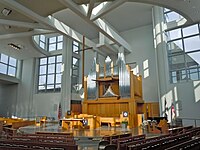Protestant Episcopal Academy
| The Episcopal Academy | |
|---|---|
 
|
|
| Address | |
|
1785 Bishop White Drive Newtown Square, Pennsylvania 19073 United States |
|
| Information | |
| Type | Private |
| Motto |
Esse Quam Videri ("To Be Rather than to Seem") |
| Religious affiliation(s) | Episcopal Church in the United States of America |
| Established | 1785 |
| Headmaster | Thomas Joseph (T. J.) Locke |
| Faculty | 180 |
| Gender | Coeducational |
| Enrollment | 1,224 |
| Average class size | 15 students |
| Student to teacher ratio | 7:1 |
| Campus | Suburban |
| Color(s) | Blue and White |
| Athletics | 29 varsity teams |
| Athletics conference | Inter-Academic League |
| Nickname | Churchmen and Churchwomen |
| Rival | The Haverford School and The Agnes Irwin School |
| Average SAT scores (2010) | 655 Math; 646 Critical Reading; 667 Writing |
| Newspaper | The Academy Scholium |
| Website | www.episcopalacademy.org |
The Episcopal Academy, founded in 1785, is a private, co-educational school for grades Pre-K through 12 based in Newtown Square, Pennsylvania. Prior to 2008, the main campus was located in Merion and the satellite campus was located in Devon. The Newtown Square facility is 123-acre (0.50 km2). Episcopal Academy has been consistently ranked as a top private school in the nation by various media outlets, including the Wall Street Journal. The Academy is affiliated with the Episcopal Church in the United States of America.
The Episcopal Academy was founded in 1785 by the Rt. Rev. William White at Old Christ Church in Philadelphia as an all-boys school focusing on education in Greek, Latin, religion, mathematics, and business. It was also a pre-missionary school. Trustees included two signers of the Declaration of Independence, as well as bankers, merchants, and reverends. The faculty was composed of notable figures like Noah Webster Jr. of Webster Dictionaries. Its first campus was located on the east side of Fourth Street and was directed by Rev. John Andrews, D.D., the Academy's first headmaster. However, when Dr. Andrews and several of faculty members left to teach at the University of Pennsylvania in 1798, The Episcopal Academy was reconstituted as a free school. In 1816 it became a Second Classical Academy and a free school again in 1828, but at some points the Academy did not operate as an educational entity.
In 1846 the school was reconstituted, this time as a Third Classical Academy, and has operated continuously since. In 1850, the school moved to a building at Juniper and Locust Street, and remained there until its 1921 move to the Merion, Pennsylvania, campus.
Female students attended the Academy between 1789 and 1818, but a plan for permanent co-education was not implemented until 1974. In 1974, girls were admitted to kindergarten, and then to one higher grade each year thereafter. The class of 1984 was the first co-educational class to graduate from the Academy.
...
Wikipedia
